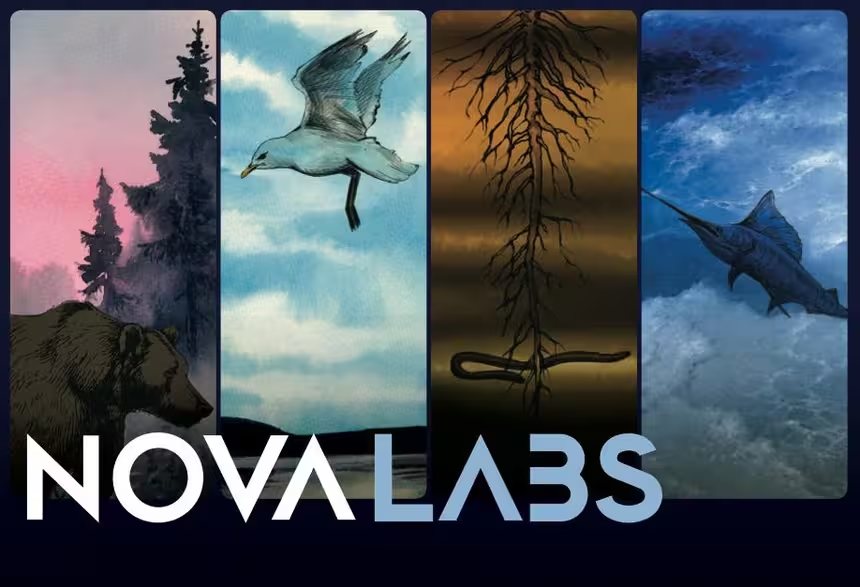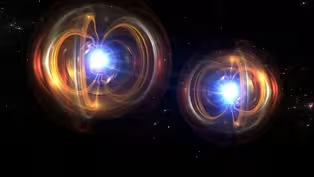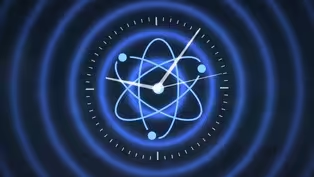
The Most Baffling Idea in Physics, Explained
Clip: Season 51 Episode 14 | 3m 33sVideo has Closed Captions
Quantum entanglement defies our everyday understanding of reality.
Quantum entanglement is one of the strangest and most fascinating phenomena in physics. Even Einstein didn’t believe it - he called it “spooky action at a distance” - but science has proven it true. Here’s a simple explanation of the most baffling concept in physics.
Problems playing video? | Closed Captioning Feedback
Problems playing video? | Closed Captioning Feedback
National Corporate funding for NOVA is provided by Carlisle Companies and Viking Cruises. Major funding for NOVA is provided by the NOVA Science Trust and PBS viewers.

The Most Baffling Idea in Physics, Explained
Clip: Season 51 Episode 14 | 3m 33sVideo has Closed Captions
Quantum entanglement is one of the strangest and most fascinating phenomena in physics. Even Einstein didn’t believe it - he called it “spooky action at a distance” - but science has proven it true. Here’s a simple explanation of the most baffling concept in physics.
Problems playing video? | Closed Captioning Feedback
How to Watch NOVA
NOVA is available to stream on pbs.org and the free PBS App, available on iPhone, Apple TV, Android TV, Android smartphones, Amazon Fire TV, Amazon Fire Tablet, Roku, Samsung Smart TV, and Vizio.
Buy Now

NOVA Labs
NOVA Labs is a free digital platform that engages teens and lifelong learners in games and interactives that foster authentic scientific exploration. Participants take part in real-world investigations by visualizing, analyzing, and playing with the same data that scientists use.Providing Support for PBS.org
Learn Moreabout PBS online sponsorship- [Narrator] Arguably the most important change in quantum physics in recent decades is a deeper understanding of a special kind of shared state called quantum entanglement.
Imagine a machine that spits out pairs of coins, which on the surface look like ordinary coins.
If you flip one, it comes up heads or tails about 50% of the time.
Nothing strange there.
But using a pair of coins fresh out of the machine, you flip one, it comes up heads, and then the other, it also comes up heads.
That could just be luck.
So then you do the same thing with another fresh pair.
This time, the first coin is tails, and so is the second.
Agreement again.
So you flip another pair and then another and another, and another.
Pair after pair, the two coins always agree on the first flip.
What's going on?
Maybe the first flipped coin, once it comes up heads or tails, is somehow telling the other coin how to behave.
To make sure that can't happen, you separate the coins by flying one to the moon and flip them at the same time, so no message could possibly travel between them.
Still, they come up in agreement.
It all sounds too strange to be true, but particles really can behave like those coins.
In quantum physics, it's called entanglement.
- Entanglement is really just a stubborn, stubborn, exciting and/or frustrating fact that takes a long time to try to get our heads around.
- Entanglement is certainly the most interesting and the most confusing aspect of quantum.
- It's one of these things we don't see that are naively in the world around us, but it is taking place deep in the materials that exist around us every day.
- [Narrator] And while you probably won't come across a coin entangler anytime soon, in the lab, scientists routinely generate pairs of entangled particles that share a quantum state so fully they can be thought of as one quantum object.
- You simply can't differentiate between them.
It's just one pure state.
- It's as though you have a single entity that's spatially separated without a physical connection.
- [Narrator] Entangled particles remain connected even when they're separated by hundreds of miles, likely far more.
- So does that mean it can go between here and Andromeda?
Probably, the equations give us no reason to think it wouldn't.
- [Narrator] Entanglement sounds bizarre.
Einstein derided the idea as spooky action at a distance, but since the 1970s, experiment after experiment has confirmed entanglement is a real quantum phenomenon.
(dramatic music)
Decoding the Universe: Quantum Preview
Video has Closed Captions
Preview: S51 Ep14 | 30s | Dive into the universe at the tiniest – and weirdest – of scales. (30s)
How Atomic Clocks Keep Perfect Time
Video has Closed Captions
Clip: S51 Ep14 | 2m 15s | Atomic clocks use quantum physics and the resonant frequency of atoms, like cesium, to define time. (2m 15s)
Providing Support for PBS.org
Learn Moreabout PBS online sponsorship
- Science and Nature

Capturing the splendor of the natural world, from the African plains to the Antarctic ice.













Support for PBS provided by:
National Corporate funding for NOVA is provided by Carlisle Companies and Viking Cruises. Major funding for NOVA is provided by the NOVA Science Trust and PBS viewers.




